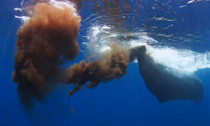
For about a decade scientists from around the world have been studying the crucial role large whales play in the health of marine eco systems. They discovered whale faeces and rotting carcasses can return stability to the world’s oceans by keeping plants and marine life fed.
As the plants absorb the liquid faeces and grow, they absorb more carbon turning the oceans into large carbon sinks.
Professor Stephen Nicol from the University of Tasmania is one of ten scientists involved in the new report conducted by the University of Vermont in the USA.
He says the whale poo theory had been around for a long time but people didn’t know what to do about it.
“A group of us in Hobart looked at how much iron there was in whale poo. Iron is important because there’s very little of it in the Southern Ocean,” he said.
Prof. Nicol says whales ingest krill that have iron concentrations 10-million times higher than iron found in sea water.
“The whales eat the krill and covert it into liquid iron and that comes out the back as liquid fertiliser.”
The study found whale movements through the water can disperse food to areas the food would otherwise not reach, and their rotting carcases provide nutrients for creatures that live on sea floors.
Large whale numbers have plummeted in the past century. Extensive hunting saw the number of blue whales reduced to 1per cent of their number. Blue fin whales were also targetted.
While blue whales can reproduce quickly, they can calve every two years, Prof. Nicol says it will take decades or even centuries for their numbers to return to pre-whaling numbers.
“We now have an unbalanced eco system because the big and top level predators have been taken out, and the system is nothing like it used to be 100 years ago,” Prof. Nicol said.
He says a stable eco system is one where we have all the various levels operating the way they evolved. But claims it’s an argument that’s difficult to sell because it’s counter intuitive to beliefs that ridding the ocean of top order fish will help fish numbers grow.











Social Profiles